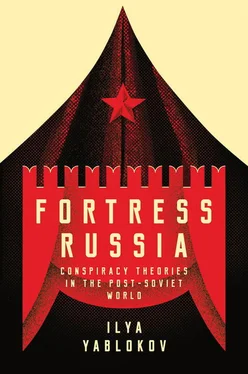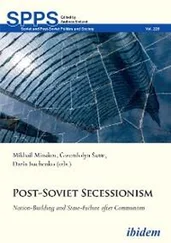Criminal investigators also participated in the programme. Showing the audience the Canadian residence permit of Nadezhda Tolokonnikova, one of the members of the band, they linked her to the intelligence services of a foreign country. Nikolai Starikov stressed that if the ‘blasphemers’ could desecrate Russian sacred heritage ( relikvii ), ‘we shall cease to be a nation’ (Spetsial’nyi korrespondent: Provokatory, 2012). Almost all participants agreed that the Russian Orthodox Church was under attack and that the Pussy Riot performance was a way of testing the ability of the Russian people to defend national values.
The programme’s journalists and guests downplayed the links between the Orthodox Church and the authorities. The guests constantly emphasized that the Church, as the keystone of the nation, was the main target of the ‘war’. The Church’s leaders had previously been criticized by the opposition because of their close relationship with the authorities; it is likely that the Kremlin needed to defuse these tensions and shift public attention to the subversive nature of the church’s critics. The conspiratorial interpretation of the Pussy Riot incident made it possible to link the band members to a subversive ‘fifth column’ of liberals with corrupt values, who were supported by the West. As Mamontov contended:
They wanted to disrupt society, to divide it and split [it]. That is what the organizers of this horrible provocation wanted to achieve. They hold nothing sacred. They did not manage to triumph in December– January and so decided to attack the most sacred thing which the people have – the Church. (Spetsial’nyi korrespondent: Provokatory, 2012)
This account of the conspiring and atheist ‘Other’ was aimed at promoting the cohesion of Russians as a single nation bound together by Orthodoxy. However, the most important link was that drawn between the political protests held in response to vote rigging at the 2011 parliamentary elections, and the Pussy Riot incident in the Cathedral. The atheism of Pussy Riot’s supporters could thus be used both as a strong argument against critics of the regime, and as a way of promoting the idea that Russian identity was based on Orthodoxy.
The decision of the Moscow court on 19 August 2012 to sentence three members of the band to two years each in prison took the media campaign against Pussy Riot to a new level. From August onwards it was possible to identify two distinct currents in the conspiratorial narrative around the case. The state-aligned media channels continued to follow the initial approach of the campaign against Pussy Riot and to defend the Church. Kirill’s statements in August and September 2012 followed the line of emphasizing the fundamental role of the Church in the preservation of Russian identity. On 9 September, during a service commemorating the bicentenary of the Battle of Borodino, Kirill drew a parallel between the Napoleonic invasion of Russia in 1812 and the current anti-church scandals. He stated that Western invaders had desecrated churches and sawn up crosses to destroy the Russian spirit (Patriarkh Kirill, 2012b). This mention of sawn up crosses connected the alleged barbarism of the French with an incident that had taken place in Kyiv in August 2012: Femen , a Ukrainian feminist group, publicly sawed a cross in half in the centre of Kyiv in support of Pussy Riot (Radio Free Europe/Radio Liberty, 2012). This was followed by several similar events in Russia, serving to promote the idea of a fully-fledged ‘war’ against the Church.
On the same day as the Borodino address, Rossiia’s weekly newscast Vesti nedeli ( News of the Week ) broadcast an interview with the Patriarch in which he claimed that the Pussy Riot case was a well-planned act of reconnaissance ( razvedka boem ) (Kiselev, 2012). This was intended to evoke fears of foreign subversion. The members of the band and their supporters were represented as part of a bigger plan to overthrow the Russian government by attacking the foundations of Russian nationhood. The repeated emphasis on the alleged link between foreign intelligence and Pussy Riot served to highlight how dangerous the band members were, both for the Russian nation and for the Church, which was its main pillar. Furthermore, at this stage of the trial, Pussy Riot began to be portrayed not only as a threat to the Church but also to the legitimacy of the authorities’ actions. This shift in interpretation significantly changed the media coverage of the story and brought a new theme into the conspiratorial narrative concerning the case.
As the trial of Pussy Riot provoked increasing domestic and international debate, the pro-Kremlin media conceptualization of the performance also underwent considerable change. Numerous world celebrities and foreign political leaders expressed support for the members of the band and criticized the Russian authorities. This international reaction enabled the pro-Kremlin intellectuals and journalists to portray it as part of the West’s plan to discredit the Russian authorities and undermine their legitimacy. The Kremlin’s concern about the Pussy Riot trial thus became a top-priority issue. Several influential participants in the Church campaign gave statements linking the Pussy Riot case to Putin’s defence of Syria in the face of the United States’ plans for military intervention. They also connected the campaign of criticism against the Kremlin with the opposition within the country, which began during the 2011 parliamentary elections. For example, Mamontov argued that Pussy Riot’s performance had been planned to make Putin vulnerable to criticism because of his position on Syria (Kots and Iakovlev, 2012). Dugin claimed that people who were hostile to Pussy Riot were actually resisting the imperialist aspirations of the USA, and in particular its plan to establish a pro-American regime in Russia (Dergachev, 2012). This shift in perspective, from religion to politics, demonstrates that the main challenge for the Kremlin was now the impact of the Pussy Riot scandal on the image of Russian elites both in the country and abroad. This change in perspective in the official discourse was also reflected in Mamontov’s show.
We have already outlined the content of the first episode. The second, broadcast on 11 September 2012, was concerned primarily with Boris Berezovskii, a fugitive oligarch and political émigré who was resident in the UK. Berezovskii was one of the important actors in Russian politics under Yeltsin who developed a bad reputation (Klebnikov, 2001), and after he left Russia he was often accused by pro-Kremlin politicians of plotting against Russia (BBC, 2013). Several guests of the show claimed he was preparing to stir unrest in Russia by attacking the Church (Spetsial’nyi korrespondent: Provokatory-2, 2012). However, the programme gave almost equal weight to a discussion of the international controversy over Pussy Riot. The studio guests contended that the British public relations agency BellPottinger had promoted Pussy Riot and used it to sling mud at the Kremlin’s image in the world. The show also included an interview with Paul Craig Roberts, a former official in the Reagan Administration and a controversial writer, who stated that the Pussy Riot debacle had been used ‘to demonize the Russian government for standing up to Washington’s intention to destroy Syria’ (Roberts, 2012). Roberts’ remarks were aimed at giving credibility to the conspiratorial notions spread by Russian journalists and public intellectuals. The fact that these experts from the West had similar ideas to those in Russia provided Russian journalists’ reports with a pseudo-objective appearance, as though they were presenting how events were seen from abroad. This was a way of countering critical opinions from domestic viewers. This use of foreign experts to provide legitimacy to controversial and, at times, conspiratorial statements appears to be a distinctive characteristic of the official Russian discourse.
Читать дальше
Конец ознакомительного отрывка
Купить книгу












